Download the May 19, 2024 CUR eNews here.
In this issue, you’ll find information on
- CUR Election News
- AURA Award
- CUR Award Celebration Ceremony
- ConnectUR 2024
- Proposal Writing Institute
- Membership Renewal
- and more
Download the May 19, 2024 CUR eNews here.
In this issue, you’ll find information on
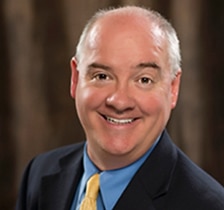
Dr. James T. LaPlant, Dean of the College of Humanities and Social Sciences for Valdosta State University (VSU) (Valdosta, GA), has been elected to serve as president of the Council on Undergraduate Research (CUR) for the membership year 2025-2026. LaPlant will become president-elect on June 1, 2024, taking a seat on CUR’s Board of Directors, and succeeding 2024-2025 CUR president Maria Iacullo-Bird (Pace University) in the summer of 2025.
LaPlant states, “I have been a member of CUR for almost 25 years, and it is a great honor to be a part of the CUR Board of Directors. Mentoring undergraduate research has been the most rewarding part of my career, and my service with CUR has been the most beneficial element of my professional development. I am excited to work with a great team to not only maintain CUR as the national voice of undergraduate research but also to ensure CUR’s leadership in the dynamically changing landscape of higher education.”
LaPlant’s long-term dedication to CUR is evident through his engagement with CUR’s Social Sciences division since its founding, his various leadership roles including chair of the Social Sciences Division from 2012-2014, and Editor-in-Chief (EIC) of the CUR Quarterly (2014-2017) and Scholarship and Practice of Undergraduate Research Journal (SPUR) (2017-2021). His guidance has helped raise the profile of CUR’s journal, expanding its reach by increasing the databases in which the journal was indexed, its inclusion of all disciplines and international perspectives, and its continued technological transformation.
Outside of CUR, LaPlant’s academic career consists of various experiences that will be applied to his position as president-elect in 2024. Mentoring over 100 undergraduate research students, his prior experience serving as a board member of the Georgia Political Science Association (GPSA) from 2003-2010, and his various professional experience as dean and professor, will contribute to his goal of overcoming the challenges of developing and growing undergraduate research programs with shrinking resources. His overall embodiment of the changing landscape will continue to help excel CUR membership now and in the future.
“Having Dr. LaPlant on the CUR Board of Directors is extremely positive for our students and faculty,” explains Dr. Sheri Noviello, Interim Provost and Vice President for Academic Affairs for VSU. “Undergraduate research has been a vital part of the VSU campus for many years. Dr. LaPlant has been instrumental in helping to establish this focus across the campus and in creating the annual VSU Undergraduate Research Symposium. He is a continuous voice of support for experiential learning which contributes to a quality educational experience for our students.”
Lindsay Currie, CUR executive officer, explains: “Having collaborated with Dr. LaPlant for over a decade, I’ve witnessed firsthand his unwavering dedication to the undergraduate research community. His forward-thinking approach and commitment to excellence have been instrumental in shaping CUR’s evolution as a leader in the field. As an experienced administrator, James has demonstrated a unique ability to innovate programs and services, ensuring their relevance and effectiveness for students. I am excited to continue our partnership and confident that under James’s leadership, CUR will continue to thrive and inspire positive change in the undergraduate research landscape.”
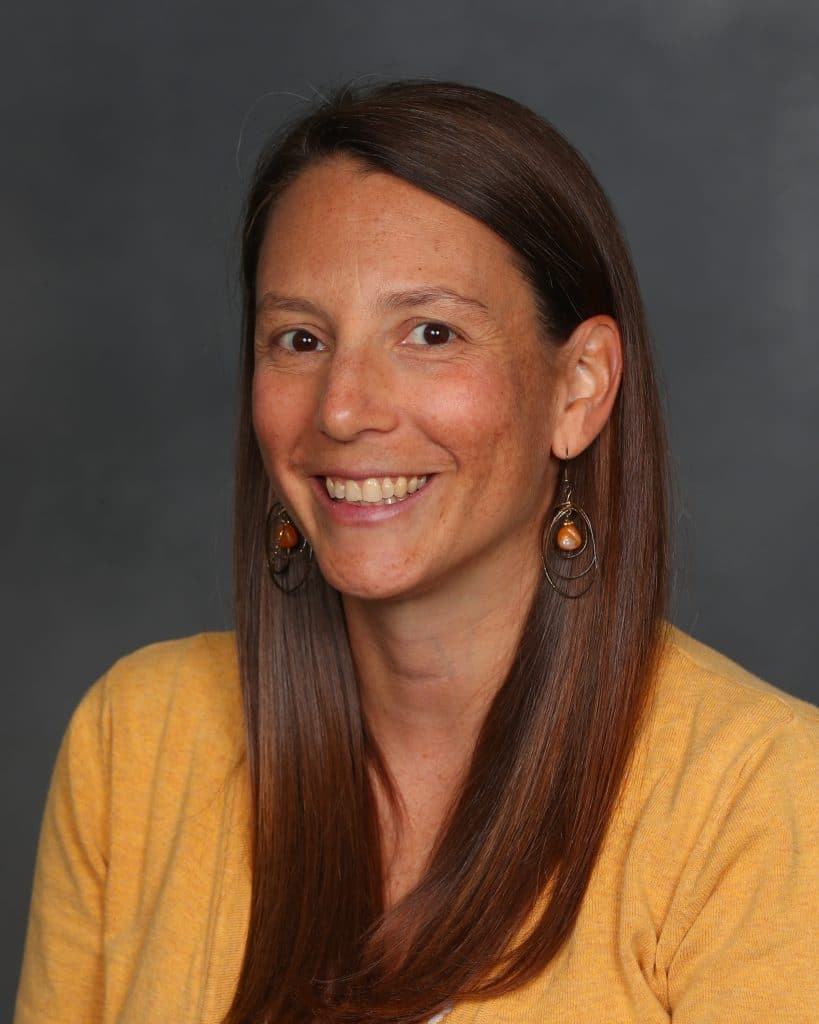
Dr. Karen K. Resendes, Associate Dean of Assessment and the First Year Experience, Professor of Biology at Westminster College (New Wilmington, PA), has been elected to serve as the Council on Undergraduate Research (CUR) Board of Directors’ Treasurer for the membership year 2024-2025. Resendes then will enter a 3-year cycle through the President ladder, serving as CUR Board of Directors’ President for the 2026-2027 membership year. Resendes will become treasurer on June 1, 2024.
Resendes states, “Since my time as an Assistant Professor, being involved with CUR has provided me with resources, collaborations, professional development, and a community of support and innovation outside of my home institution. As I have watched CUR grow and evolve through my various roles with the organization over the past ten years, I have seen the amazing impact and potential we can have on undergraduates and faculty alike. I am thrilled to take my commitment to CUR to the next level with this leadership role on the Board of Directors in order to help shepherd the organization as we navigate the future of higher education to achieve CUR’s vision of enriching and advancing society through undergraduate research, scholarship, and creative inquiry.”
Resendes has held various leadership roles within CUR including Biology Councilor (2012-2023), Biology Division Representative (2023-present), Faculty Workload, Evaluation, Promotion, and Tenure Task Force member (2017-2023), and Foresight Guidance, and Resource Development Advisory Group Committee Chair (2023-2024) in addition to holding a spot on CUR’s previous Executive Board (2017-2023). She states her proudest accomplishment took place when she held the CUR Biology Division Chair role (2017-2020), in which she was able to provide support and resources to help develop the Mentoring Integration of Research into the Curriculum (MIRIC) program, a successful initiative still ran by the CUR Biology Division. From her many supportive mentors and various held roles, Resendes is a proven passionate equipped leader with skills in futures thinking, budget awareness and understanding, and a vision that will employ the highest level of CUR leadership through her role as treasurer and president.
“As a national leader in undergraduate research, CUR sets a high standard for experiential learning in higher education,” states Dr. Jamie McMinn, Vice President for Academic Affairs and Dean of the College, Professor of Psychology at Westminster College. “I am pleased that Dr. Resendes has been selected to serve on the CUR Board, knowing that she brings a strong commitment to undergraduate research and student success to all that she does. Dr. Resendes’ selection further recognizes the great work that Westminster has accomplished in the area of undergraduate research, and we look forward to sharing our successes with and learning from other board members and CUR membership.”
Lindsay Currie, CUR executive officer, explains: “Dr. Resendes embodies the essence of leadership, dedication, and vision within the Council on Undergraduate Research. Her tireless commitment to CUR and undergraduate research for over a decade is a testament to her unwavering passion and devotion. As our newly elected Treasurer, Karen brings not only her expertise but also her boundless energy and collaborative spirit to the role. She is a true visionary and team lead, respected by her peers for her integrity, insight, and ability to inspire positive change. We are honored to have Karen as part of our CUR leadership, and we look forward to the remarkable contributions she will continue to make in advancing our mission”
In addition to the Board of Directors, the Council on Undergraduate Research (CUR) has a governance structure that includes Councilors and Division Representatives who serve to further the mission of the organization. These individuals are highly engaged volunteers who have a passion for undergraduate research and contribute as thought leaders. Councilors and Division Representatives are charged from the 13 divisions, including Arts and Humanities, At-Large, Biology, Chemistry, Education, Engineering, Geosciences, Health Sciences, Mathematical, Computing, and Statistical Sciences, Physics and Astronomy, Psychology, Social Sciences, and Undergraduate Research Programs.
CUR congratulates these new and or re-elected councilors and division representatives on their new term starting on June 1, 2024.
The following CUR members have been elected as CUR Councilors. These individuals will serve as an advisory body to the Board of Directors and in a communication capacity, bridging the insight of the Divisions to the work of CUR as a whole by encouraging meaningful sharing of trends, challenges, and opportunities from the divisional level.
The following CUR members have been elected as Division Representatives. These individuals will serve as a crucial link between the organization and its members, helping to advance undergraduate research through programmatic resource development, networking, and mentor development opportunities, advocacy at their home institution, and other activities and events throughout their term.
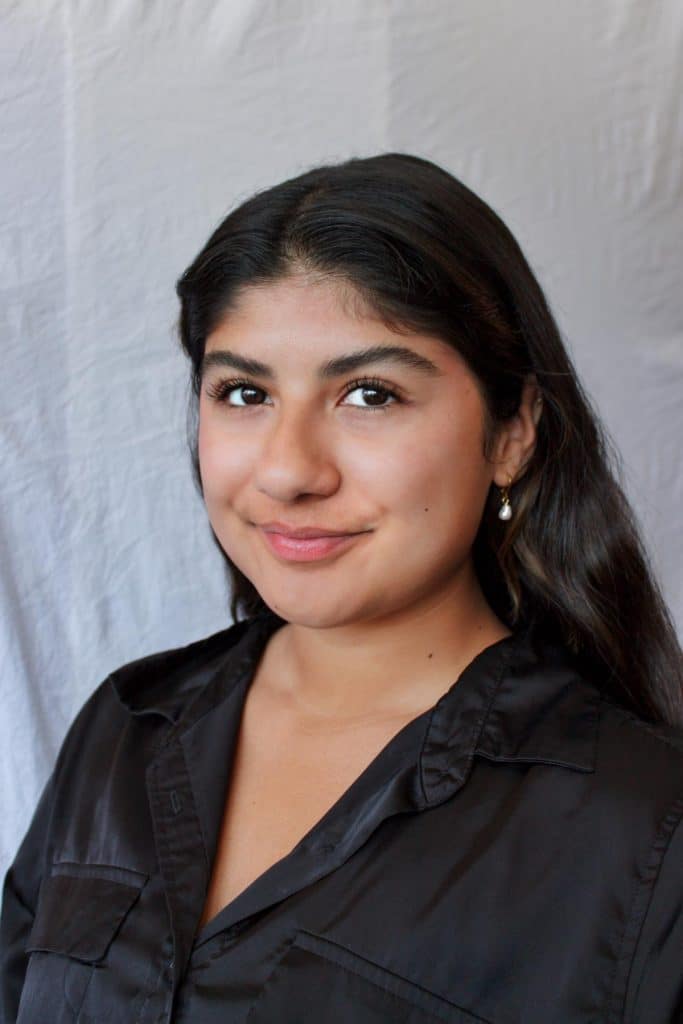
Amplifying diverse voices on the College of Saint Benedict and Saint John’s University campuses.
That’s the purpose behind “We’re Here,” an undergraduate research project put together by first-year student Jazmin Acuna Diaz under the guidance of CSB and SJU professor of political science Christi Siver.
It consists of a series of interviews Acuna Diaz conducted with four CSB and SJU students from different backgrounds, bringing their distinct and unique stories to what Acuna Diaz and Silver hope will be a wider audience among the two campus communities.
“Our starting point was really just telling these stories,” said Acuna Diaz, a 2022 graduate of Big Lake (Minnesota) High School.
“Coming from a minority background, there were times I didn’t fully see the value of sharing my story. But after working on this project, I realize there are a lot of people who haven’t heard stories like these, or who may not realize what the person sitting next to them in class has gone through.”
Acuna Diaz was scheduled to be among the more than 700 students presenting their research, creative work or scholarship at the 23rd annual Celebrating Scholarship & Creativity Day on Thursday, April 27.
“The biggest takeaway for me from these interviews was that we tend to put people in boxes, but everyone has an individual story to tell,” Acuna Diaz said. “Throughout my work, I was aware of the fact that the students I interviewed trusted me to hold their stories in my hands. I had a responsibility to make sure they were accurately represented.”
The project came about through the Emerging Scholars Program, which is designed to “provide first-year students that have been traditionally underrepresented in higher education or their field of study access to three high-impact practices over the course of their first year at CSB and SJU: undergraduate research, learning in community and meaningful on-campus student employment.”
It was born of an idea Siver had after attending a panel discussion at the CSB and SJU Multicultural Center.
“It was the CSB/SJU version of the ‘Green Card Voices’ project that (advocacy group) Unite Cloud did with local immigrants (in Central Minnesota),” Siver said. “My colleague (in the political science department), Pedro dos Santos, chaired a discussion involving four different students from different immigration backgrounds. And it struck me that we should try to share these stories more widely.
“A lot of times, we don’t get to know other people on campus outside of classes. This seemed like a way to both increase awareness and help create a more inclusive environment.”
The onset of the COVID-19 pandemic delayed the idea from getting off the ground, but Siver applied to have it accepted as part of the Emerging Scholars program beginning with the fall semester in 2022.
That, in turn, connected her with Acuna Diaz, who is a bio-chemistry major after originally planning to major in nursing and took a course in the narrative practices minor.
“It was focused on finding ways of telling stories to help people heal,” Acuna Diaz said. “It seemed like there were a lot of aspects of that which fit really well with this project.
“I related to it because I was born in Monticello, but my parents were immigrants from Mexico. Growing up in a predominately white community, I did struggle at times with taking pride in my nationality and culture, or sharing my story with other people.”
Siver hopes the project continues in the years to come, hopefully with Acuna Diaz serving as a mentor.
“Jazmin brought such a fresh perspective and energy to this,” Siver said. “She’s exceptionally well organized and very task orientated. She’s a self-starter. If you give her direction, she goes out and get things done.
“She really put in some amazing work, and it shows.”
Acuna Diaz was among the students selected as CSC Day Spotlight recipients because they delivered “timely projects that exceed expectations,” and each project represented the ability to “Think Deeply.” The complete list of award winners and their projects is as follows:
The following students were Distinguished Thesis Scholars (graduating seniors who have completed a three-semester-long independent research project):
Written by: Frank Rajkowski for the College of Saint Benedict and Saint John’s University; used with permission. Find the original article here
Download the May 5, 2024 CUR eNews here.
In this issue, you’ll find information on
Download the April 22, 2024 CUR eNews here.
In this issue, you’ll find information on
University of Missouri-Kansas City’s Aleigha Dollens wins geoscience award 34 years after her mentor, Tina Niemi, who was the first award recipient.
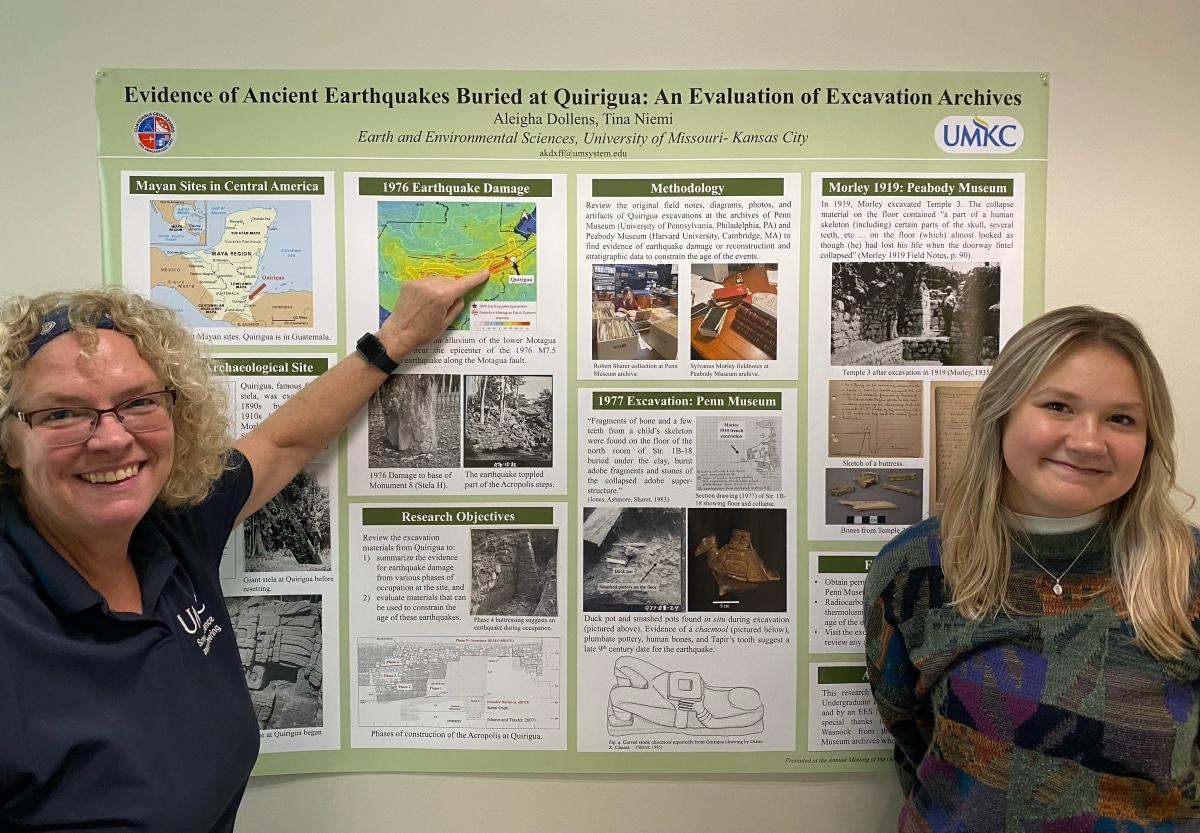
Earth and environmental science student Aleigha Dollens recently won the 2023 Richard Hay Award from the Geoarchaeology Division of the Geological Society of America (GSA) for her research on evidence of earthquakes at the Mayan archaeological site of Quirigua in Guatemala. The award supports travel to the GSA annual meeting and recognizes meritorious student research.
This was especially good news to Dollens’ mentor, Tina Niemi, Ph.D., as the Curators’ Distinguished Teaching Professor was the first recipient of this award 34 years ago.
Niemi has taught geology at UMKC since 1995 and has personally mentored more than 60 undergraduate research projects with student funding from SEARCH, SUROP and NSF-funded research experience grants.
“For my MS research, I reconstructed the paleoenvironmental history of a submerged classical archaeological site along the central coast of Greece,” Niemi said. “It was the presentation of that research at the annual meeting of the GSA in 1989 that won me the first-granted Richard Hay award. I am very proud of Aleigha and her achievements and thrilled that she has followed in my footsteps with this well-deserved award. The dedication of UMKC and its leaders to support undergraduate research is phenomenal.”
Dollens and Niemi visited the University of Pennsylvania and Harvard University this past summer to search museum archives for excavation documents and artifacts that can help constrain the date of the earthquake that occurred during the final occupation of the Quirigua site.
“Winning the Richard Hay Award from the Geoarchaeology Division of the Geological Society of America is an honor like no other, especially since Dr. Tina Niemi was the first-ever recipient,” Dollens said. “She is one of my greatest supporters and pushes me to be a better geoscientist and a better person. It is an honor to get to work with such a strong woman in the geosciences field and I would not be where I am today if it weren’t for her ongoing support.”
The research was funded by the UMKC Undergraduate Research Program through SUROP and SEARCH awards and by the Earth and Environmental Science Newcomb Research Grant.
Written by: Krithika Selvarajoo for the University of Missouri-Kansas City; used with permission. Find the original article here
University of Missouri’s Scholars Program Promotes Research in the Arts, Social Sciences, and Humanities
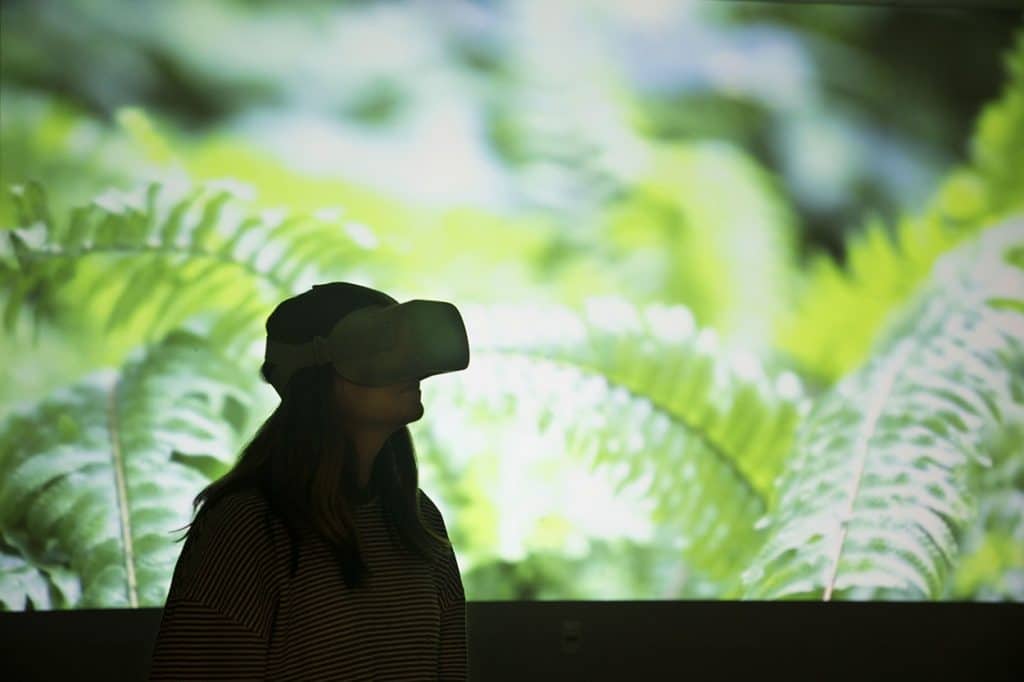
A unique collaboration between the University of Missouri Office of Undergraduate Research and the MU Honors College has led to an ongoing research opportunity for undergraduate students involved in the arts, social sciences and humanities (ASH) disciplines.
The ASH Scholars Program began in 2016 and has continued to grow over the years, including bringing in a new team this year. With the addition of the Santa Fe Trail research project, the ASH Scholars Program now features five teams that research a variety of topics.
“The goal was to replicate the benefits of working in a team like science laboratories do – but in the arts, social sciences and humanities,” said Linda Blockus, director of the Office of Undergraduate Research. “Oftentimes, undergraduate research and scholarship in these disciplines consists of a single student meeting with their advisor, without the interaction with other students. In science labs, the members work together on common problems, spending time bouncing ideas off each other, discussing results, and learning techniques and research skills from more experienced team members.
“With the multi-year approach to ASH Scholars, students can be involved in an ongoing, team-oriented project for potentially four years, growing from an inexperienced first-year student to a seasoned upperclassman who takes on a leadership role in the group.”
ASH Scholars receive a $3,000 scholarship, disbursed in four equal parts over the academic year. While the Honors College plays an important role in the program, students do not have to be pursuing the Honors Certificate to participate. Students of all academic majors and grade levels are invited to get involved.
Each ASH team consists of eight to 12 undergraduate students who work closely with faculty mentors on an established research project. The ASH teams are:
“The ASH Scholars Program is one of the best kept secrets at Mizzou,” said Catherine Rymph, dean of the Honors College. “The program provides opportunities not often available to students in the arts, social sciences and humanities. Students get so much out of the experience, working over several years on team research with the dedicated faculty who lead these teams. ASH students have numerous opportunities to take on leadership roles and have presented their work at national and international conferences, been listed as authors on publications, and received fellowships for graduate study. No matter what they move on to after graduation, they benefit from the skills they develop as part of these collaborative research teams.”
The team aspect is one of the most vital parts of the program. Students oftentimes bring in different skillsets, allowing for a great mix of experiences. Many students also join as freshmen or sophomores, meaning their project tasks grow each year. Students generally start with data collection and move into data management roles. Eventually, they have the opportunity to present their work at conferences and forums, including to a public audience during Show Me Research Week, where all ASH team members present.
“The ASH Scholars Program really allows for team members to draw on each other’s’ strengths,” Blockus said. “Research projects are also seldom complete in nine months – it builds on prior findings and may veer off in new and exciting directions. With the security of multiple years of funding, ASH teams have been able to launch multi-year projects. That extended time allows students to develop skills, build confidence, establish a supportive peer community and assume leadership roles.”
While students benefit from the hands-on nature of the work, the faculty leads have also enjoyed being part of the program. Each research project that the ASH teams are participating in was born out of ongoing work from at least one of the current faculty leads.
“We’re blessed to have this program at Mizzou,” said Chris Josey, an associate teaching professor of communication at MU and one of the faculty leads of the Minority Focused News as a Locus of Empowerment team. “It’s great to have leadership who is committed to what we’re doing. The work that each team is doing is valuable. I think it’s one of the coolest programs on campus, and it’s inspired me to get more involved with undergraduate research. I want to help students find these outstanding experiential learning opportunities.”
“It can definitely be tough as faculty are oftentimes spread very thin,” added Amanda Rose, a professor of psychological sciences and one of the leads of the Close Relationships team. “It’s tough to take on another project; however, it’s so rewarding to help the students find their passions. Plus, our ASH teams contribute so much to MU’s overall research portfolio. We all benefit at the end of the day.”
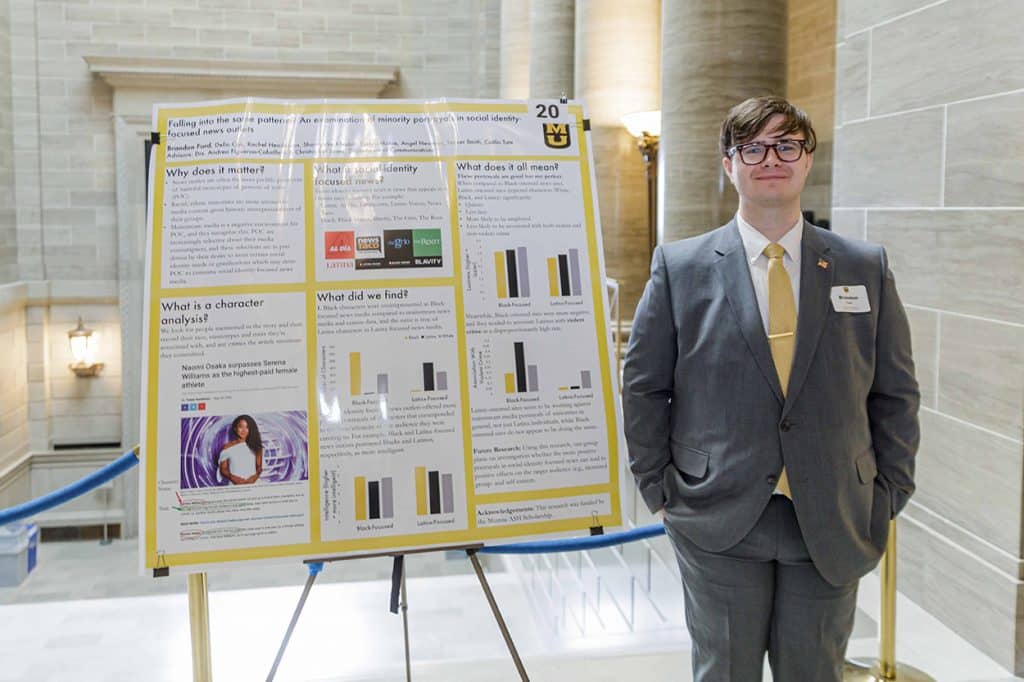
Learn more about each of the ASH teams:
Art of Death
The main goal of this innovative and interdisciplinary research project is to normalize conversations about death and dying through analysis of public structures and memorials through the lens of artistic production. The strategies for achieving this overall goal include generating creative projects that explore death and dying utilizing new media tools such as virtual reality, projection mapping, augmented reality and video art.
Close Relationships
This research teams pursues knowledge related to the science of close relationships. They approach the study of relationships from a lifespan perspective, with a primary focus on childhood and adolescence. The research studies include friends and family members. They are interested in how youths’ interactions with close relationship partners shape their development and emotional adjustment.
Collaborative Research in African Languages (CORAL)
The purpose of the CORAL team is to contribute to research in African linguistics at the University of Missouri. The CORAL team currently has two main strands of research in the study of African languages that are connected to one current grant and one prior grant from the National Science Foundation.
Minority Focused News as a Locus of Empowerment
The Minority Focused News team investigates the manners in which news websites and streaming platforms that serve under-represented and marginalized populations provide a prosocial benefit to society. Historically, they have analyzed the content present on these sites and presented at local, regional and national conferences. The team has recently branched out to examine the cognitive benefits these sites provide marginalized and under-represented groups and other forms of social identity content (e.g., streaming platforms).
Santa Fe Trail
The objective of this team is to excavate historical data and narrative concerning the Santa Fe Trail. The second objective is to communicate the importance of the trail to public audiences.
Written by: Logan Jackson for the University of Missouri; used with permission. Find the original article here